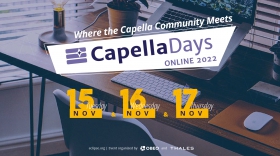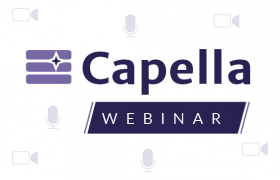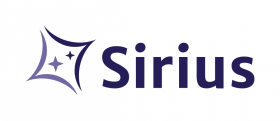 Capella Days 2022, organized by Obeo and Thales, brings together the community of Capella and Arcadia: creators of this innovative systems engineering solution, providers of Capella add-ons and services, MBSE experts and industrial users.
Mainly featuring Capella complimentary tools and add-ons, in 2022 we decided to focus on industrial MBSE case-studies.
Check-out the program featuring nine interesting talks from Capella's feedback on their experience from different engineering domains:
ESI-TNO / Thermo Fisher Scientific
PGM / COMAC
Thales Defense Mission Systems
Saratech
CILAS - Ariane Group
Naval Group
Siemens DIS
Politecnico di Milano
Thales Avionic Systems
...
Capella Days 2022, organized by Obeo and Thales, brings together the community of Capella and Arcadia: creators of this innovative systems engineering solution, providers of Capella add-ons and services, MBSE experts and industrial users.
Mainly featuring Capella complimentary tools and add-ons, in 2022 we decided to focus on industrial MBSE case-studies.
Check-out the program featuring nine interesting talks from Capella's feedback on their experience from different engineering domains:
ESI-TNO / Thermo Fisher Scientific
PGM / COMAC
Thales Defense Mission Systems
Saratech
CILAS - Ariane Group
Naval Group
Siemens DIS
Politecnico di Milano
Thales Avionic Systems
...
News
 Capella Days 2022, organized by Obeo and Thales, brings together the community of Capella and Arcadia: creators of this innovative systems engineering solution, providers of Capella add-ons and services, MBSE experts and industrial users.
Mainly featuring Capella complimentary tools and add-ons, in 2022 we decided to focus on industrial MBSE case-studies.
Check-out the program featuring nine interesting talks from Capella's feedback on their experience from different engineering domains:
ESI-TNO / Thermo Fisher Scientific
PGM / COMAC
Thales Defense Mission Systems
Saratech
CILAS - Ariane Group
Naval Group
Siemens DIS
Politecnico di Milano
Thales Avionic Systems
...
Capella Days 2022, organized by Obeo and Thales, brings together the community of Capella and Arcadia: creators of this innovative systems engineering solution, providers of Capella add-ons and services, MBSE experts and industrial users.
Mainly featuring Capella complimentary tools and add-ons, in 2022 we decided to focus on industrial MBSE case-studies.
Check-out the program featuring nine interesting talks from Capella's feedback on their experience from different engineering domains:
ESI-TNO / Thermo Fisher Scientific
PGM / COMAC
Thales Defense Mission Systems
Saratech
CILAS - Ariane Group
Naval Group
Siemens DIS
Politecnico di Milano
Thales Avionic Systems
...
 Discover the replay of the webinar (Thursday, December 19th, 2023)
Making Arcadia work for you - a look at framework tailoring in Thales UK
Architecture frameworks provide an approach to describing systems and the presentation of these elements and relationships to deliver the stakeholder needs. Essentially, frameworks provide templates for our engineering artefacts.The design of a framework must accommodate a level of freedom in its usage; specific enough to answer the majority of stakeholder concerns, whilst generic enough to allow for differences between projects. This balancing act often results in framework design being more generic to allow for a wider audience. Having an untailored framework, which is more ‘open’, can lead to creating inconsistent viewpoints.Arcadia is one such framework as implemented through the Capella tool. The framework provides 4 perspectives/levels for product definition:- The Operational Analysis, where the user needs are considered. Note: n...
Discover the replay of the webinar (Thursday, December 19th, 2023)
Making Arcadia work for you - a look at framework tailoring in Thales UK
Architecture frameworks provide an approach to describing systems and the presentation of these elements and relationships to deliver the stakeholder needs. Essentially, frameworks provide templates for our engineering artefacts.The design of a framework must accommodate a level of freedom in its usage; specific enough to answer the majority of stakeholder concerns, whilst generic enough to allow for differences between projects. This balancing act often results in framework design being more generic to allow for a wider audience. Having an untailored framework, which is more ‘open’, can lead to creating inconsistent viewpoints.Arcadia is one such framework as implemented through the Capella tool. The framework provides 4 perspectives/levels for product definition:- The Operational Analysis, where the user needs are considered. Note: n...
 Watch the replay:
Model Simulation and Analysis in Capella
Through a large number of engineering practices in China, we found that customers not only pay attention to how the object product can be modeled more quickly and reasonably, but also pay attention to the correctness of the model itself. Therefore, the simulability and analyzability of the model are very important.
Users expect Capella to provide value in logic simulation and parametric analysis. According to the needs of customers, improvements have been made in the following aspects:
1. We decided to add the concept and related elements of activity diagrams in Sysml to Capella to make the function flow executable;2. Referring to the state machine specification in Sysml, we assign dynamic execution rules to the elements in the Capella state machine so that they can be simulated and operated;3. Support nested calls and interrupt logic between state machines and activity diagrams to enrich the simulation scenarios.4....
Watch the replay:
Model Simulation and Analysis in Capella
Through a large number of engineering practices in China, we found that customers not only pay attention to how the object product can be modeled more quickly and reasonably, but also pay attention to the correctness of the model itself. Therefore, the simulability and analyzability of the model are very important.
Users expect Capella to provide value in logic simulation and parametric analysis. According to the needs of customers, improvements have been made in the following aspects:
1. We decided to add the concept and related elements of activity diagrams in Sysml to Capella to make the function flow executable;2. Referring to the state machine specification in Sysml, we assign dynamic execution rules to the elements in the Capella state machine so that they can be simulated and operated;3. Support nested calls and interrupt logic between state machines and activity diagrams to enrich the simulation scenarios.4....
 Thursday, September 15th, 2022 5:00 PM CET / 11:00 PM EST
A Case-Study by Rolls Royce Control Systems
Rolls-Royce Control Systems supplies control and monitoring systems for a variety of sectors including civil aerospace. These control systems are required to be designed, certified, and delivered to the highest level of safety assurance.
In this talk, we present CaMCOA Studio, a domain-specific modelling workbench based on open-source modelling technologies including Sirius, the Eclipse Modelling Framework (EMF), Xtext, and Epsilon.
CaMCOA Studio is being used to architect and integrate the software for all current and future Rolls-Royce engine control and monitoring systems.
Justin Cooper (ROLLS-ROYCE)
Justin Cooper is a principal software engineer at Rolls-Royce based in Birmingham, UK. Since 2018, he has been working with Rolls-Royce and the University of York developing domain-specific languages, model-based tooling, and model transformations. Justin holds a ...
Thursday, September 15th, 2022 5:00 PM CET / 11:00 PM EST
A Case-Study by Rolls Royce Control Systems
Rolls-Royce Control Systems supplies control and monitoring systems for a variety of sectors including civil aerospace. These control systems are required to be designed, certified, and delivered to the highest level of safety assurance.
In this talk, we present CaMCOA Studio, a domain-specific modelling workbench based on open-source modelling technologies including Sirius, the Eclipse Modelling Framework (EMF), Xtext, and Epsilon.
CaMCOA Studio is being used to architect and integrate the software for all current and future Rolls-Royce engine control and monitoring systems.
Justin Cooper (ROLLS-ROYCE)
Justin Cooper is a principal software engineer at Rolls-Royce based in Birmingham, UK. Since 2018, he has been working with Rolls-Royce and the University of York developing domain-specific languages, model-based tooling, and model transformations. Justin holds a ...
 Watch the replay:
Simulation with Python and MATLAB® in Capella
A common need in system architecture design is to verify that the architecture is correct and can satisfy the requirements. Execution of system architecture model means to interact with state machines to test system’s control logic. It can verify if the logical sequences of functions and interfaces in different scenarios are desired.
However, only sequence itself is not enough to verify its consequence or output. So we need each function to do what it is supposed to do during model execution to verify its output, and that is what we called “simulation”. This presentation introduces how to embed Python or MATLAB® codes inside functions to do “simulation” within Capella.
Renfei Xu
Renfei Xu is the Technical Director of MBSE from PGM. He has participated in many implementation projects of MBSE in areas like Engine Control, Avionics, Mechatronics, RADAR and so on. In recent years, he is dedicated to th...
Watch the replay:
Simulation with Python and MATLAB® in Capella
A common need in system architecture design is to verify that the architecture is correct and can satisfy the requirements. Execution of system architecture model means to interact with state machines to test system’s control logic. It can verify if the logical sequences of functions and interfaces in different scenarios are desired.
However, only sequence itself is not enough to verify its consequence or output. So we need each function to do what it is supposed to do during model execution to verify its output, and that is what we called “simulation”. This presentation introduces how to embed Python or MATLAB® codes inside functions to do “simulation” within Capella.
Renfei Xu
Renfei Xu is the Technical Director of MBSE from PGM. He has participated in many implementation projects of MBSE in areas like Engine Control, Avionics, Mechatronics, RADAR and so on. In recent years, he is dedicated to th...


